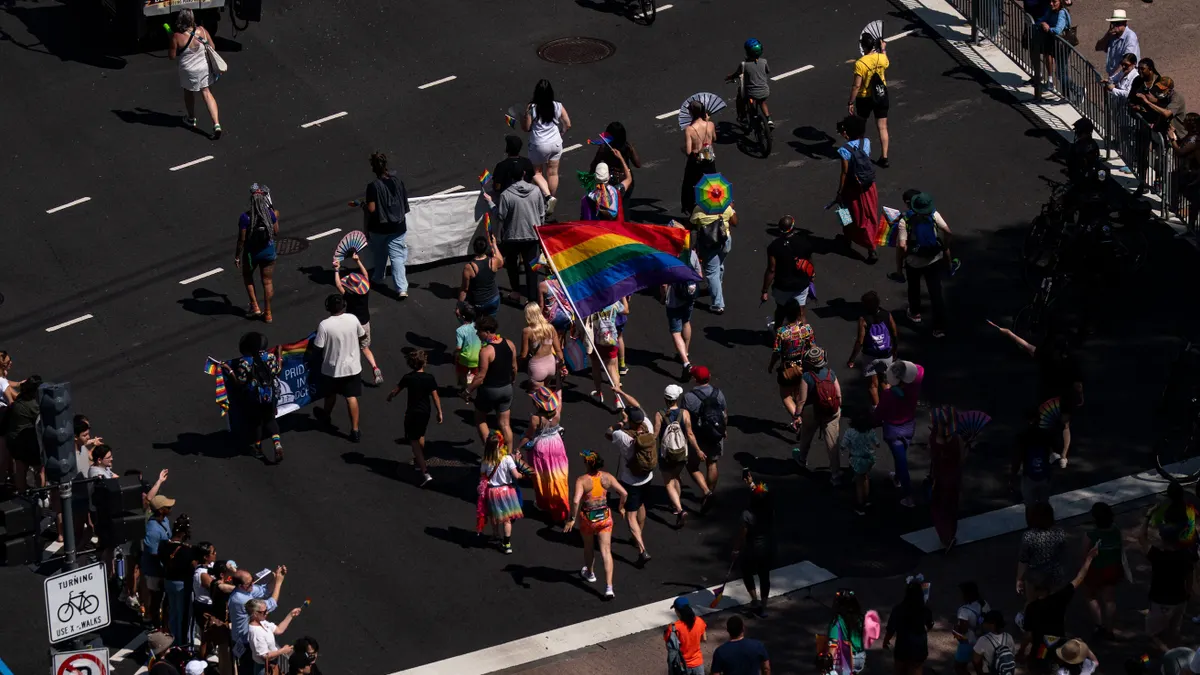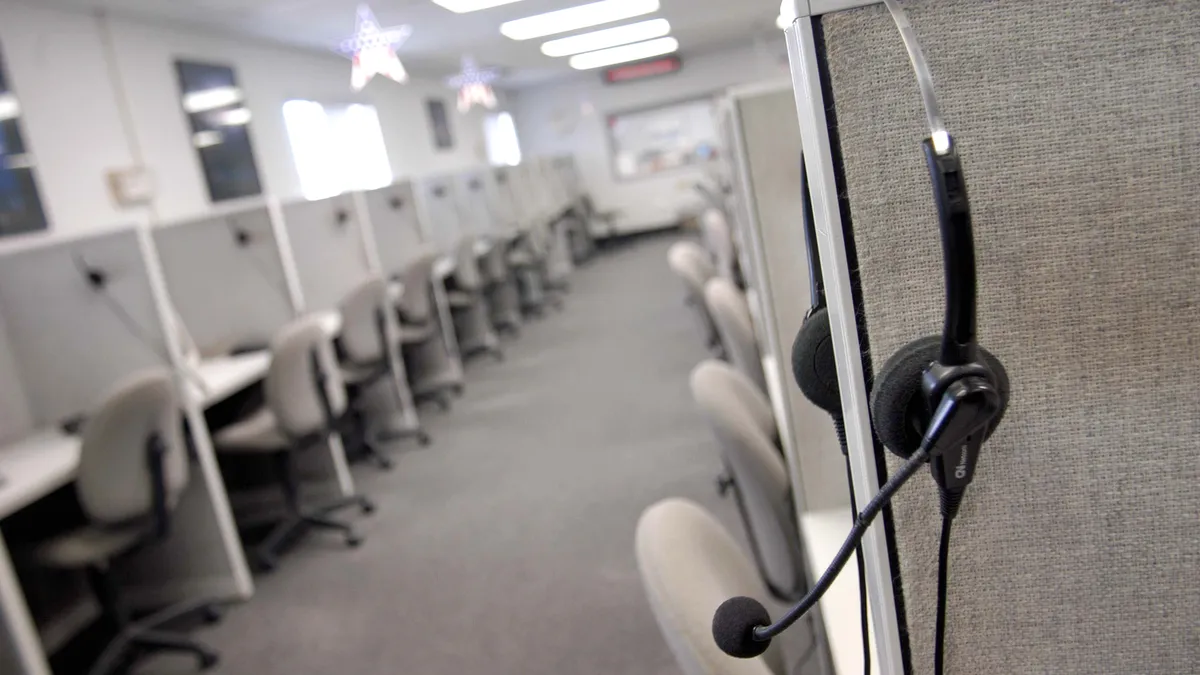LGBTQ+ workers have long reported hurdles in U.S. workplaces and the last few years are no exception.
More than half of these workers responding to a survey said they don’t have an LGBTQ+ employee group or equivalent resource at work, according to a 2025 report from Monster. And while some LGBTQ+ people told Monster they feel more comfortable discussing gender or sexuality at work — compared to last year — more than twice as many told Monster they feel less comfortable.
At a time like this, employers may be wondering how to show up during Pride Month, often celebrated in June with corporate-funded banners for ERGs to carry in parades, branded swag for employees and more.
WorldPride 2025: A case study in corporate participation
Cities throughout the country are hosting Pride parades and other events this month, but D.C. — this year’s host for WorldPride — drew large crowds, an especially star-studded concert line-up, and lots of mixed feelings about the politics around Pride — including the reported dearth of corporate sponsors.
This year’s sponsors included both companies that have maintained existing public-facing DEI commitments as well as those that have scaled back. Supporters included JPMorgan, airlines United and Delta, hoteliers Hilton and Hyatt, retailer H&M, and fashion house Tapestry, among others.
Giant Food, which has not changed its DEI message recently, told HR Dive via a spokesperson that the company is proud to support WorldPride. “Since 2016, Giant has participated in Pride events, including Capital Pride, Baltimore Pride, and Pride Nights with local professional sports teams,” they said.
Amazon, on the other hand, announced a shift in its focus earlier this year. Still, the company “recognizes cultural moments and celebrations throughout the year internally with employees, and externally, as we have in years past,” a spokesperson told HR Dive. “We remain committed to building a diverse and inclusive company.”
A clash in the capital city
The WorldPride designation is meant to bring attention and positive economic impact to its chosen city.
But, ahead of the parade, some hospitality partners said travel to the city was not on pace with projected numbers. Organizers acknowledged some stakeholder objection to participation due to the U.S.’s political directives targeting gay and trans people.
The events took place against that backdrop, especially with respect to workplace issues.
As soon as the administration changed hands, the U.S. Equal Employment Opportunity Commission told its workers to pause the processing of LGBTQ+ discrimination claims, eventually abandoning lawsuits it had filed on behalf of trans workers.
At the time, Acting Chair Andrea Lucas also said EEOC would aim to rescind anti-harassment guidance addressing gender identity, although a judge vacated the relevant portions shortly thereafter.
And in late May, right before Pride kicked off, the agency said it would no longer fund state and local investigations of transgender workplace discrimination.
Widespread reassessment of corporate responsibility
Given the slew of public DEI decommitments since last summer and an anti-DEI administration now in the Oval Office, navigating the Pride season may feel like especially tricky waters. Along with potential compliance concerns, companies may have to re-assess employer branding.
“Now, some companies are reimagining DEI and they’re using different language as, rightly or wrongly, they have to deal with the federal government,” said Curtis Sparrer, principal and co-founder of PR and marketing agency Bospar. “They have to make numbers and they have to put food on the table for their staff, so they’re weaving around it so that they might not have the ‘DEI’ target [on their back].”
Notably, in a report released on Inauguration Day, 1 in 8 employers surveyed by Resume.org said they planned to weaken their DEI commitments in 2025.
Speaking about his own PR agency, Sparrer noted, “It’s easy to stand firm on DEI when you are a company in San Francisco tech — so I don’t want to give ourselves a medal of courage for doing that. It’s the right thing, but it’s also the thing that people would expect.”
“I think where we should be giving real credit is to companies that are standing up for DEI, and they are either not in tech or not on the coast. They are having to stand firm despite any sort of criticism,” he said. “That gives me hope — when I see a company stick to its guns there despite immense pressure.”
Looking forward, in June and beyond
Some employers are monitoring these shifts, looking to see how other companies address Pride and whether they experience fallout.
New York City’s Pride parade comes later this month, and NYC Pride’s media and marketing manager, Kevin Kilbride, said that the parade has more corporate sponsorship than last year. “That said, we are still only at [approximately] 80% of our 2025 fundraising goal, as we did see some partners substantially pull, scale back, or reallocate sponsorship dollars this year,” he told HR Dive in an email.
Some sponsors have told Kilbride that this is due to economic uncertainty, particularly around the impact of the tariffs. “Others have expressed concern about potential blowback from the current administration for publicly supporting Pride and other DEAI initiatives,” Kilbride said.
Those involved with Atlanta’s Pride festival, slated for October, have had similar discussions. Steven Igarashi-Ball, director of communications and community engagement for Atlanta Pride, said his team is “monitoring these developments while continuing to engage with both long-time supporters and new partners.” Year-to-year changes are to be expected, he said via email, but Atlanta Pride is “actively engaged in conversations with a wide range of prospective sponsors” for the October event.
Apart from funding for parade floats and employee events — which can create opportunities to bond with co-workers in person — employers’ engagement with Pride can directly translate into off-the-clock well-being support for LGBTQ+ workers and on-the-clock engagement, experts say.
“It’s beyond disheartening that we’ve seen some corporations bow to public pressure and step back from being voices for change,” Kilbride of NYC Pride said.
“We need corporations and partners of all sizes to step up to the plate, stay on the right side of history and support the entire LGBTQIA+ community. We’re here. We’re queer. And we’re not going anywhere,” Kilbride said. “Regardless, our community will do what it has always done — from Stonewall, to Compton’s Cafeteria to the youth-led trans protests today — we march on.”





















